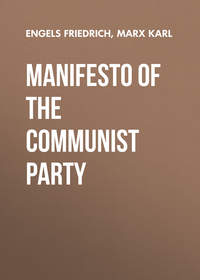 полная версия
полная версияLandmarks of Scientific Socialism: "Anti-Duehring"
We now know that the rule of reason was nothing more than the rule of the bourgeoisie idealised, that eternal right found its realisation in bourgeois justice, that equality was materialised in bourgeois equality before the law, that when the rights of man were proclaimed bourgeois rights of property were proclaimed at one and the same time, and that the state of reason, Rousseau's Social Contract, could only come into existence as the bourgeois democratic republic. To such a slight extent could the great thinkers of the eighteenth century, just as their predecessors, prevail over the limits which their own epoch had placed upon them.
But besides the antagonism between feudal baron and bourgeois there existed the general antagonism between the robbers and the robbed, between the rich idlers and the toiling poor. It was just this antagonism which made it possible for the leaders of the bourgeoisie to pose as the representatives not merely of a special class but of the whole of suffering humanity. Furthermore the bourgeoisie was saddled with an antithesis right from the start. Capitalists cannot exist without laborers, and, in proportion, as the members of the gilds in the Middle Ages developed into the modern bourgeois, the journeymen of the gilds and the day laborers, on their part, developed into the proletariat. And though the bourgeois, as a general rule, might claim to represent also the interests of the different working classes of the period, still, independent movements of the latter classes broke out in connection with each great movement on the part of the bourgeoisie; such working classes being the more or less developed predecessors of the modern proletariat. Thus there came into being at the time of the German Reformation and the Peasant War the party of Thomas Munzer, in the great English Revolution the Levellers, and in the great French Revolution, Baboeuf.
Besides these revolutionary demonstrations of a class still undeveloped, occurred certain theoretical manifestations of a corresponding nature. Thus in the sixteenth and seventeenth centuries, utopian pictures of an ideal social condition, in the eighteenth century, absolutely communistic theories (Morelly and Mably). The demand for equality was confined no longer to political rights, it had to be extended to the social condition of individuals; the demand was made for the abolition not merely of class privileges but of class distinctions also. An ascetic communism patterned on that of Sparta was the first form which the new teachings assumed. Then came the three great utopians – Saint Simon, in whose eyes bourgeois aims possessed a certain merit as well as those of the proletariat: then Fourier and Owen, who, in the land of the most highly developed capitalistic production, and under the influence of the antagonisms which arise therefrom, developed in direct relation to French materialism their proposals which tended to the abolition of class distinctions.
One common feature pertaining to all the three is the fact that they did not appear as the representatives of the interests of the proletariat which had been in the meantime developed through the historical process. Like the philosophers, their ambition is not to free a particular class but the whole world. Like them they wish to introduce the government of reason and eternal justice. But there is a world of difference between their government and that of the philosophers. According to the philosophers, the bourgeois world as it exists is unreasonable and unjust and is destined for the rubbish heap, just as feudalism and all other earlier forms of society. The reason that true justice and reason have not dominated the world is because up to the present man has not properly comprehended them. That a man of genius has appeared and that the truth concerning these things should have now been made clear are not results arising from a combination of historical progress and necessity, but a mere piece of luck. He might just as well have been born five hundred years earlier and saved mankind the mistakes, conflicts and sorrows of five hundred years.
This is actually the idea of all English and French socialists and of the earlier German socialists, Weitling included. According to this view, socialism is the expression of absolute truth, reason, and justice, and only has to be perceived in order to vanquish the world by reason of its truth. Hence, absolute truth, reason, and justice vary according to each founder of a school, and therefore with each one, the variety of absolute truth, reason and justice is dependent, in turn, upon the subjective temperament of that founder, his conditions of life, the extent of his knowledge and mental discipline, so that in this conflict of absolute truths there is no possible solution save that they rub each other smooth by mutual contact. Hence nothing could result from it except a sort of eclectic, average socialism, which is, as a matter of fact, up to the present, the prevailing notion in the minds of the great majority of socialist agitators in France and England – a mixture admitting of manifold shades, of a few notable critical utterances, economic teachings and pictures of a future state of society by leaders of different sects, a mixture which flows all the easier in proportion as the sharp precise corners are rubbed off the separate notions in the stream of debates, just as pebbles become round in a brook.
In order that a science can be made out of socialism it is first necessary that it be placed on a sound basis.
Meanwhile, close to and just after the French philosophy of the eighteenth century, the new German philosophy arose and culminated in Hegel. Its greatest service was the restoration of the dialectic as the highest form of thought. The old Greek philosophers were all natural dialecticians, and the most universal intellect among them, Aristotle, was already the discoverer of the essential forms of dialectic thought. On the other hand, subsequent philosophy although in it there were brilliant exponents of the dialectic (e.g. Descartes and Spinoza), was more and more involved in the so-called metaphysical mode of thought, chiefly owing to English influence which completely mastered the French philosophers, at least of the eighteenth century. Outside of the strict frontiers of philosophy, masterpieces of the dialectic might be found occasionally of which I can only recall "Rameau's Nephew" by Diderot, and the treatise upon the origin of human inequality by Rousseau.
We now give briefly the essential features of the two modes of thought: we will return to them more fully later.
If we examine nature, the history of man or our own intellectual activities, we have presented to us an endless coil of interrelations and changes in which nothing is constant whatever be its nature, time or position, but every thing is in motion, suffers change, and passes away. This original, naïve and very nearly correct philosophy of the world is that of the old Greek philosophers and was first put in a very clear form by Heraclitus. Everything is and yet is not, since everything is in a state of flux, is comprehended as undergoing constant modification, as eternally existing and disappearing. But this philosophy, correct as it is as regards phenomena in general, viewed as a picture, is insufficient to explain the individual phenomena of which the picture of the universe is composed, and as long as we cannot do that we are not clear about the general picture. In order to study these individual phenomena we are obliged to take them out of their natural or social connection, and examine each of them by itself according to its own form and its particular origin and development. This is the task of natural science and historical investigation, branches of discovery to which the Greeks of classical times assigned a subordinate place for very good reasons, since they, first of all, had to collect the material. The beginning of an exact observation of nature was made first by the Greeks of the Alexandrine period, and was later developed further by the Arabs in the Middle Ages. True natural science hence dates from the second half of the fifteenth century, and from then on has advanced at a constantly growing rate. The dissection of nature into its separate parts, the separation of different natural events and natural conditions into certain classes, the examination of the interiors of organic bodies with respect to their manifold anatomical forms, furnished the fundamental reasons for the progress in a knowledge of nature which the last four hundred years have brought in their train. But it has caused us occasionally to drop into the habit of regarding natural phenomena and events as entities, apart from the great universal interrelations, and therefore not as moving but quiescent, not as changeable in their essence but fixed and constant, not in their life but in their death. And hence, just as happened with Bacon and Locke, this point of view has been carried over from science into philosophy, and has constituted the specially narrow view of the last century, the metaphysical mode of thought.
For the metaphysician, things and their pictures in the minds, concepts, are separate entities, one following the other without any regard to each other, stable, rigid, eternally fixed objects of investigation. The metaphysician thinks in antitheses. His conversation is "Yea, yea; Nay, nay" and whatsoever is more than these cometh of evil. For him a thing exists or it does not exist, a thing can never be itself and something else at the same time; positive and negative are mutually exclusive, cause and effect stand in stiff antagonism to each other. This method of thought seems at the first glance to be quite plausible because it is in accordance with sound common sense. But sound common sense, respectable fellow though he may be in his own home surrounded by his four walls, meets with strange adventures when he betakes himself into the wide world of investigation; and the metaphysical way of looking at things, sound and useful as it is, under given conditions, runs sooner or later into a stone wall, beyond which it is one-sided, stupid and abstract, and loses itself in insoluble contradictions. Because it omits to notice the interrelations of the individual phenomena, their existence, their coming and their going, their static and mobile conditions, and so to speak does not see the forest for trees. We know for example, with sufficient certainty for every day affairs, whether an animal is alive or dead, but, on closer examination, we find that this is sometimes no easy matter to decide, as jurists know very well and have gone indeed to great pains to discover a rational border line beyond which the killing of a child in the womb of its mother is murder. It is just as impossible too to fix the precise moment of death, for physiology shows that death is not a single and sudden event but a very slow process. Just so is every organic being at the same moment itself and not itself. Every moment it takes up matter coming to it from the outside and throws off other matter, every moment its body-cells die and are recreated. Indeed after a longer or shorter period the whole material of the body is renewed through the taking up of other particles of matter so that each organic being is at the same time itself and something else. We find also if we look at the matter more closely that the two poles of an antithesis, positive and negative, are just as inseparable as they are antagonistic, and that they, in spite of all their fixed antagonisms permeate each other, also that the cause and effect are concepts which can only realise themselves in relation to a particular case. However when we come to examine the separate case in its general relation to the world at large they come together and dissolve themselves in face of the working out of the universal problem, for, here, cause and effect exchange places, what was at one time and place effect becoming cause and vice versa.
All these phenomena and thought-concepts do not fit into the frame of metaphysical philosophy. According to the dialectic method of thinking which regards things and their concepts in relation to their connection with each other, their concatenation, their coming into being and passing away, phenomena, like the preceding, are so many confirmations of its own philosophy. Nature is the proof of the dialectic, and we must give to modern science the credit of having furnished an extraordinary wealth and daily increasing store of material towards this proof, and thereby showing in the last instance things proceed dialectically and not in accordance with metaphysical notions. But as the scientists who have learned to think dialectically may be still easily counted, the chaos arising from the confusion between actual results and an antiquated mode of thought is thus explained, and this confusion is to-day dominant in theoretical science, and drives teachers and pupils, writers and readers to despair.
A correct notion of the universe, of the human race, as well as of the reflection of this progress in the human mind can only be had by means of the dialectic method, together with a steady observation of the change and interchange which goes on in the universe, the coming into existence and passing away, progressive and retrogressive modification.
And the later German philosophy has proceeded from this standpoint. Kant began his career in this way by abolishing Newton's conception of a stable solar system which persisted after receiving its first impulse, in favor of a historical process, to wit, the origin of the sun and all the planets from a rotating mass of nebulæ. From this concept he drew the conclusion that, granted this origin, the future dissolution of the solar system is inevitable. His theory was mathematically proved by Laplace half a century later, and half a century later still the spectroscope discovered the existence of such glowing masses of gas in space in different stages of condensation.
This later German philosophy found its conclusion in the philosophy of Hegel where for the first time, and this is his greatest service, the entire natural, historical and spiritual universe was regarded as a process, that is, as in constant progress, change, transformation and development, and the attempt was made to show the more subtle relations of this process and development. From this historical point of view the history of mankind no longer appeared as a barren confusion of mindless forces, all alike subject to rejection before the judgment seat of the most recently ripened philosophy, and which, at the very best, man puts out of his mind as soon as possible, but as the development-process of humanity itself, to follow the process of which, little by little, through all its ramifications, and to establish the essential laws of which, in spite of all apparent accidents, is now the task of philosophic thought.
It is immaterial at this place that Hegel did not solve this problem. His epoch-making service was to have proposed it. It is a problem, moreover, which no individual can solve. Though Hegel, next to Saint Simon, was the most universal intellect of his time he was still limited, in the first place, through the necessarily narrow grasp of his own knowledge and in addition through the limitations of the contemporary conditions of knowledge. There was a third reason, too. Hegel was an idealist, that is he regarded thought not as a mere abstract representation of real phenomena, but, on the contrary, phenomena and their development appeared to him as the representations of the Idea which existed before the world. The result was an inversion of everything, the actual interrelations of the universe were turned completely upside down, and though of these interrelations, many single ones were set out justly and correctly by Hegel, much of the detail is patched, labored, made up, in short, incorrect. The Hegelian system was, to speak briefly, a colossal miscarriage, and the last of its kind. It rested on an incurable contradiction; on the other hand, it actually proclaimed the historical conception according to which human history is a process of development, which, in its very nature, cannot find its intellectual conclusion in the discovery of a so-called absolute truth, on the other hand it declared itself to be the central idea of just such an absolute truth. An all embracing and determined knowledge of nature and history is in absolute contradiction with the foundations of dialectic thought, but it is not denied, on the contrary, it is strongly affirmed, that the systematic knowledge of the entire external world may from age to age make giant strides.
The total perversion of modern German idealism of necessity drove men to materialism, but not, and this is well worth noting, to the mere metaphysical mechanical materialism of the eighteenth century. In contradiction to the naïvely simple revolutionary pushing on one side of all earlier history, modern materialism sees in history the process of the development of society, to discover the laws of whose development is its task. In contradistinction to the conception of nature which prevailed among the French philosophers, as well as with Hegel, as something moving in a narrow circle with an eternal and unchangeable substantial form, as Newton conceived it, and with invariable species of organic beings, as Linnæus thought, materialism embraces the more recent discoveries of natural science, according to which nature has also a history in time. For the forms of the worlds, like the species of organisms by which they are inhabited under suitable conditions, come into being and pass away, and the cycles of their progress, in so far as it is permissible to use the term, take on eternally more magnificent dimensions. In either case it is entirely dialectic and no longer forces a static philosophy upon the other sciences. As soon as the demand is made upon each separate branch of science that it make clear its relation to things in general, and science as a whole, the individual science thereupon becomes superfluous. Of all philosophy up to the present time the only peculiar property which remains as its characteristic is the study of thought and the formal laws of thought – logic and the dialectic. All else belongs to the positive sciences of nature and history.
While the revolution in natural science was only able to be completely carried out in proportion as investigation furnished the necessary positive material, there were known a multitude of earlier historical facts which gave a distinct bias to the philosophy of history. In 1831 in Lyons the first purely working class revolt occurred. The first national working class movement, that of the English Chartists, reached its height between 1838 and 1842. The class war between the proletariat and the bourgeoisie proceeded historically in the most advanced European countries just in proportion as the newly developed greater industry has progressed, on the one hand, and the political power of the bourgeoisie on the other. The teachings of the bourgeois economists with respect to the identity of the interests of capital and labor and with respect to the universal peace and well being which would follow as a matter of course from the adoption of free trade were more and more contradicted by facts. All these things could be as little ignored as the French and English socialism which was their theoretical though very insufficient expression. But the old idealistic philosophy of history which was as yet by no means laid aside knew nothing of class wars dependent upon material interests, and nothing of material interests, specially. Production, like all economic phenomena only occupied a subordinate position as a secondary element of the "history of civilisation." The new facts, moreover rendered necessary a new investigation of all preceding history and then it became evident that all history up to then had been a history of class struggles and that these mutually conflicting classes are the results of a given method of production and distribution at a given period, in a word, of the economic conditions of that epoch. Hence, that the economic structure of society at a given time furnishes the real foundations upon which the entire superstructure of political and juristic institutions as well as the religious, philosophical and other abstract notions of a given period are to be explained in the last instance. Idealism was thereupon driven from its last refuge, the philosophy of history; a materialistic philosophy of history was set up, and the path was discovered by which the consciousness of man could be shown as springing from his existence rather than his existence from his consciousness.
But the socialism which had existed so far was just as incompatible with the materialistic conception of history as was the naturalistic French materialism with the dialectic and the modern discoveries in natural science. The then existing socialism criticised the prevailing capitalistic methods of production and their results but it could not explain them and thus could not match itself against them, it could only brush them on one side as being bad. But it was necessary to show, on the one hand, the capitalistic methods of production in their historical connection, and their necessity at a given historical epoch and therefore the necessity of their ultimate disappearance. On the other hand their inner character had to be explained and this was all the more concealed for criticism had up to then been chiefly engaged in pointing out the evil results flowing from them rather than in destroying the thing itself. This was made clear by the discovery of surplus value.
It was shown that the appropriation of unpaid labor is the basis of the capitalistic mode of production and the robbery of the worker is carried out by its means; that the capitalist, although he buys the labor-force of the worker at the full value which it possesses in the market as a commodity, yet derives more from it than he has paid for it, and that in the last instance this surplus creates the total amount of value from which the capital steadily increasing in the hands of the capitalistic class is amassed. The phenomenon not only of capitalistic production but of the creation of capital has thus been explained.
For these two great discoveries, the materialistic conception of history and the disclosure of the mystery of capitalistic production we must thank Marx. Granted these, socialism became a science, which thereupon had to busy itself in the working out of these ideas in their individual aspects and connections.
Thus matters stood in the realm of theoretical socialism and the dead philosophy (of metaphysics Ed.) when Herr Eugene Duehring, with no slight impressement sprang up before the public and announced that he had accomplished a complete revolution in political economy and socialism.
Let us now see what Herr Duehring promises and – how he keeps his promises.
II. What Herr Duehring Has to SayUp to now, the notable writings of Herr Duehring are his "Course of Philosophy," his "Course of Political and Social Science" and his "Critical History of Political Economy and Socialism." The first work is the one which particularly claims our attention.
Right on the first page Herr Duehring announces himself as "one who claims to represent this power (of philosophy) at the present time and its unfolding in the undiscoverable future." He discovers himself, therefore, as the one true philosopher for the present and the hidden future. Whoso differs from him differs from truth. Many people even before Herr Duehring, have thought this about themselves or something like it, but, with the exception of Richard Wagner, he is the first who has allowed himself to say it right out. And, as a matter of fact, the truth, as it is handled by him is "a final truth of the last instance." Herr Duehring's philosophy is "the natural system, or the philosophy of reality… Reality is so understood as to exclude every sudden impulse towards an unreal and subjectively limited comprehension of the universe." The philosophy is therefore so shaped as to exclude Herr Duehring himself from the somewhat obvious limitations of his own personal, subjective narrowness. It is quite necessary to explain how this miracle is worked, if he is in a position to lay down unquestionable truths of the last instance, though, for our part, we cannot discover any particular merit in them. This "natural system of valuable knowledge" has "with great profundity established the foundation forms of existence." Out of his real critical attitude proceed the elements of a real critical philosophy, based on the realities of nature and life, which does not allow of any merely imaginary horizon but in its mighty revolutionary progress opens up the earth and heaven of external and inner nature; it is a "new method of thought" and its results are "from the bottom up, peculiar results and philosophies … system-shaping ideas … fixed truths." We have in it before us "a work which must seek its force in the concentrated initiative," whatever that may mean; an "investigation reaching to the roots … a rooted science … a severely scientific conception of things and men … a comprehensive thorough effort of the mind … a creative sketch of suppositions and conclusions from overmastering ideas … the absolute fundamental." In the realm of political economy he gives us not only "historical and systematic comprehensive efforts" of which the historical are moreover distinguished by "my presentation of history in the grand style" and those in political economy have produced "creative movements," but closes with a special completely elaborated scientific scheme for a future society which is "the actual fruit of a clear and basic theory," and is therefore just as free from the possibility of error and as individual as Duehring's philosophy … for "only in that socialistic structure which I have disclosed in my "Course of Political and Social Science" can a true ownership arise in place of the present apparent private property which rests on force such an ownership as must be recognised in the future."






